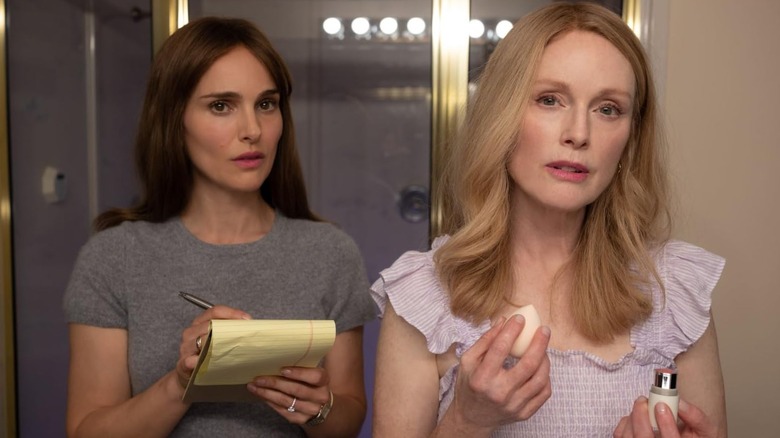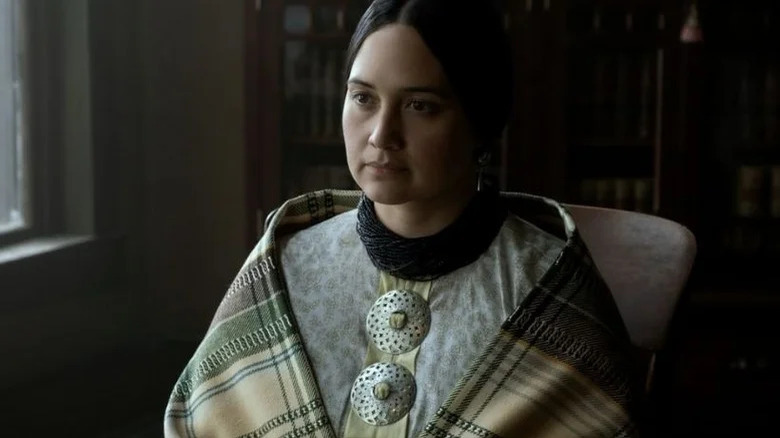Netflix's May December Is The Latest Chapter In 2023's Reckoning With True Crime Stories
Todd Haynes' "May December" is the most deliberately uncomfortable movie of 2023, but you owe yourself a viewing. Gracie Atherton-Yoo (Julianne Moore) is a middle-aged woman with a husband, Joe (Charles Melton), less than half her age; they met when he was in 7th grade and she groomed him.
Before you ask, no, depiction is not an endorsement here. Gracie is self-pitying and manipulative, Joe is trapped in arrested development, and the movie hammers in how destructive their "relationship" has been for him; part of him wants to escape but doesn't know how. "May December" enters murky waters to ask tough questions about the audience's relationship to sensationalism.
As Haynes has acknowledged, Samy Burch's screenplay is loosely inspired by the life of Mary Kay Letourneau, a real predator who married her victim Vili Fualaau after being convicted in 1997. These events were a media sensation and have been echoed in film before, from the 2000 TV movie "All-American Girl" to the 2006 film "Notes on a Scandal" (starring Cate Blanchett as a British art teacher who is sleeping with a student).
With the benefit of hindsight to the real case (Fualaau divorced Letourneau in 2019 and she passed away the following year), "May December" focuses on the years' later aftermath. The "in" to the story is that an actress, Elizabeth Berry (Natalie Portman), visits the Yoo family to prep for playing Gracie in a movie. This framing provides the key to "May December."
Digging up the past
Elizabeth picks at the past like a vulture. She goes to the pet shop where Gracie and Joe met and insists on seeing the storage room where they were discovered. She mimes having sex on the exit door's stairs, diving straight into perversion to mimic Gracie. She also looks over auditions by child actors to play Joe alongside, choosing them to her liking like Gracie chose Joe's fate.
To commit herself to her role, Elizabeth even seduces Joe, but shows the limits of her empathy by calling his past "a story" — neither woman sees him as a real person. Joe does give Elizabeth a letter Gracie wrote him back in 1992. Cue a facing-the-camera monologue of Elizabeth reading the letter (in Gracie's lisp) like a screen test. As the monologue went on, I thought the movie might be wrapping up here; with Elizabeth now inhabiting Gracie like a ghost, what else was left to say?
I was wrong, the movie carries on for about 15 more minutes, but it ends in a similar — and better — place. Elizabeth is finally on the set of the Gracie and Joe movie; the ending is her doing multiple takes of a scene where Gracie is seducing Joe by showing him a snake that "doesn't bite" (the symbolism!).
Thinking about this ending, I feel it's representative of a film/TV trend.
An ouroboros of true crime critique
2023 saw the finale of "Barry," Bill Hader's HBO series about a hitman wanting to be an actor. The series ends with a show-within-a-show; Barry's son John (Jaeden Martell) watches "The Mask Collector," a sanitized portrayal of his father's life and implicitly a trashy TV movie. The critique of poorly-reported true crime stories is blatant.
Then there's Martin Scorsese's "Killers of the Flower Moon," about the real-life series of murders in 1920s Oklahoma to steal oil wealth away from the native Osage tribe. Rather than the go-to text epilogue for historical dramas, the movie ends with a radio show live performance; the on-stage actors explain the fates of the players involved with exaggerated accents and corny sound effects.
But then, Scorsese himself cameos and reads the obituary of Mollie Kyle (Lily Gladstone), the sister of many victims who narrowly escaped being poisoned by her white husband Ernest Burkhart (Leonardo DiCaprio). As the announcer notes soberly, Mollie died before her would-be killers and her obituary had no reference to the Osage murders.
The ending of "Killers of the Flower Moon" is autocritique; the radio show is taking a community's tragedy and spinning entertainment out of it, just like the film is, and empathy for the victims can only be so much consolation. Scorsese's appearance is to solidify the link between the radio show and the movie surrounding it. "May December" makes a similar statement; Elizabeth's movie is sure to be exploitative, but isn't "May December" itself dramatizing Letourneau's real crimes?
Is this a sign that Hollywood is changing its ways and pivoting away from true crime? Doubtful. While the 21st-century rise of podcasts has ballooned true crime, it's not a new entertainment trend. However, these endings collectively illustrate what the value of dramatizing real stories can be.
The purpose of true crime
Speaking at the New York Film Festival, Haynes said he wanted to examine "This idea of how does this kind of original relationship occur? What is the myth these two people tell each other about the roles they're playing?" The idea of getting to the heart of a narrative by replicating it recurs in "May December." While sitting in an acting class, Elizabeth is asked why she would want to play a bad person. She answers: "I want to find a character that's difficult to ... on the surface ... understand. I want to take the person, I want to figure out why were they like this."
Her visit to the Yoos was because she wanted to "understand" Gracie beyond the decades-old tabloids. That's also why Joe invites her into their lives; he thinks they can convince her to tell the "real" story of how in love he and Gracie are. Instead, Elizabeth's presence shakes Joe out of the lies he's been telling himself, played with tenderness by Melton. "May December" isn't focused on salacious details of what happened to Joe, but on how it's shaped him as a person.
The ending of "Barry" shows how we find comfort in lies, which is why the truth is so often distorted. "Killers of the Flower Moon" warns about how easy it is to sensationalize even when trying to be honest. "May December" shows why we must remember that true crime tales are more than simple stories and those involved are not characters, but people.
"May December" is streaming on Netflix.



